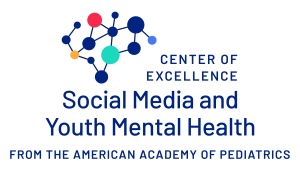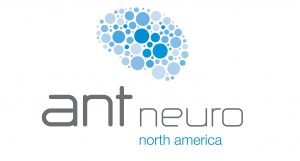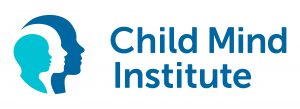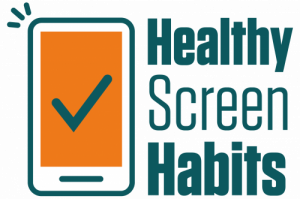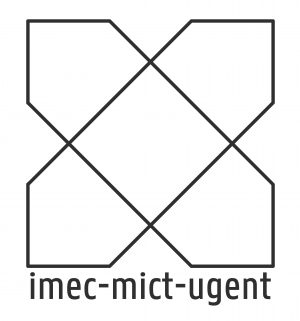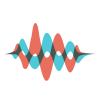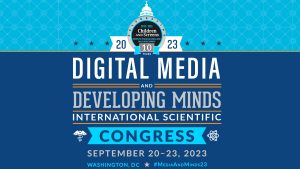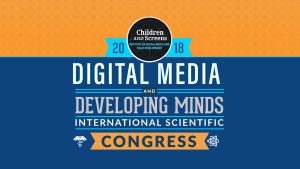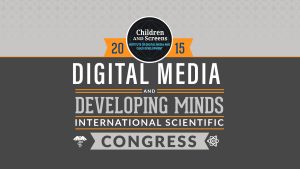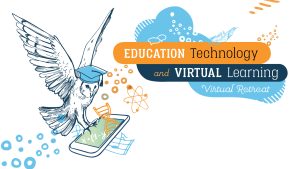Tools and Methodologies Exhibitors
The American Academy of Pediatrics’ Center of Excellence on Social Media and Youth Mental Health is dedicated to creating a healthy digital ecosystem for children and adolescents. The Center began in Fall 2022 and is guided by co-medical Directors, Megan Moreno, MD, MPH, MSEd, FAAP and Jenny Radesky, MD, FAAP, who are pediatricians and experts in the field of youth development and media.
The Center has three main goals:
-
- Improve pediatric mental wellbeing by reducing the risks and leveraging the benefits of social media
- Build the capacity of individuals who work with youth to mitigate social media’s impact on mental wellbeing and promote healthy social media use
- Synthesize and promote the evidence base and best practices for healthy social media use via communication, guidance, and other resources
The Center of Excellence on Social Media and Youth Mental Health has created dozens of resources for clinicians, educators, parents and youth. Key resources include:
-
-
- The 5 Cs of Media Use – The 5 Cs is a mnemonic that can be used to talk to parents about kids and screens. They are: Child, Content, Calm, Crowding Out, and Communication.
- Question & Answer Portal – A collection of submitted questions on social media and youth mental wellbeing.
- Conversation Starters for Families of Tweens and Teens – This resource gives parents and guardians ideas and examples to help start conversations with tweens and teens about technology, social media, and video games.
- Building Healthy Relationships with Media: Essential Skills for Children 10 and Younger – These activity card keychains contain games and activities that help younger children build balance, critical thinking, self-regulation, and safety skills.
- Glossary of Digital Media Platforms – A one-stop-shop website with detailed settings and parental control information about commonly used video sharing, social media and gaming apps.
-
ANT Neuro is a technology leader in high-density EEG and neuromodulation, offering state-of-the-art systems tailored to the demanding requirements of cutting-edge research.
At the 2025 Tools and Methodologies Exposition, ANT Neuro showcased its eego™ and visor2 product lines. The eego™ line of EEG devices and new saline-based EEG nets enable efficient collection of high-density EEG data (8 – 256 channels) either at rest or during movement. With up to 16 kHz sampling rate, 256 EEG channels, and unique software features, the eego product line gives you an unprecedented in-depth understanding of the human brain. The adaptable eego sports package options contain everything you need for your mobile EEG research.
Also on display was visor2, ANT’s complete product solution for the most advanced research and reproducible treatment in neuromodulation with non-invasive transcranial magnetic stimulation (TMS). visor2 supports a variety of navigated TMS applications, such as simultaneous EEG-TMS recording and motor mapping with up to 8 EMG channel.
Aura builds tools to help keep families safe online. Our recently released Balance features offers parents and children AI-powered tools to ensure that kids are staying safe, healthy, and happy with their online activities, all while protecting their privacy and autonomy. Features include a detailed understanding of day and nighttime usage patterns, analysis of social patterns and expressed mood, and weekly highlights indicating online strengths and interests. Led by a team of clinical and developmental psychologists, all of our tools are built based on current research evidence, established professional guidelines, and decades of clinical experience.
As part of our commitment to building evidence-based tools, we are also actively engaged in conducting innovative research in two primary ways. First, we are conducting our own large-scale, national, prospective study to better understand the relationship between objective markers of device usage in children and adolescents and its relationship to a range of mental health and other important outcomes. Our Technology Exposure and Child Health: Wellness Impact and Social Effects (TECHWISE) study will be an important data source to address this critically important area. Our second area of research involves freely and openly sharing a wide range of de-identified data from our commercial users (covered under an IRB-approved Waiver of Consent), as well as our TECHWISE study data with academic researchers interested in this area. We are already collaborating with a range of institutions, including the Winston Center at UNC-Chapel Hill, Boston Children’s Hospital, and Penn/CHOP. Interested investigators should contact us for more information on data access or free access to our products for data capture.
Brain Vision (www.brainvision.com) is a trusted partner for neurophysiological researchers specializing in advanced EEG, fNIRS, actigraphy, and multimodal solutions including with pediatric populations. They support researchers across developmental and translational domains by helping them select and effectively utilize state-of-the-art hardware and software from the world’s leading manufacturers. They offer personalized guidance, training, and support to help researchers maximize their research potential and advance the field of neuroscience.
At the 2025 Tools and Methodologies Exposition, Brain Vision shared tools and software to integrate EEG, fNIRS, actigraphy, eye tracking and other peripheral physiological measures to support research examining the impact of screen time and media usage on attention and cognitive development across childhood. Learn more about:
-
- The X.on mobile EEG system with PEER data collection software (https://brainvision.com/products/x-on-peer/)
- The Cortivision SPECTRUM platform for fNIRS data collection (https://brainvision.com/products/cortivision-spectrum/)
- movisens’ Move devices for measuring peripheral physiology (GSR, EKG, general actigraphy) across a day (https://brainvision.com/products/?filter-vendors=movisens-2)
The Child Mind Institute (CMI) is an independent nonprofit dedicated to transforming the lives of children and families struggling with mental health and learning challenges through science, clinical care, and education.
At the 2025 Tools and Methodologies Exposition, CMI highlighted three innovative tools designed to bring high-quality data collection and mental health support into real-world environments:
-
- Curious: A secure, no-code research platform that enables the design and deployment of ecological momentary assessments, cognitive tasks, and interventions at scale.
- Mirror: A youth-centered journaling app for ages 13+ co-developed with youth and clinicians, which captures mood check-ins and expressive content (text, audio, video) and allows researchers to explore emotional patterns through a secure Research API.
- Mobile Brain/Body Imaging (MoBI) Lab: A suite of tools for psychophysiological and neurological measurement in naturalistic settings.
- Curious: A secure, no-code research platform that enables the design and deployment of ecological momentary assessments, cognitive tasks, and interventions at scale.
Together, these tools support more inclusive, scalable, and ecologically valid approaches to mental health research and care.
Fairplay and the Phone-Free Schools Movement are partnering to create healthier, more focused learning environments for children and teens. Fairplay is the leading nonprofit advocating for children’s well-being by eliminating exploitative marketing and Big Tech practices. Founded by Dr. Susan Linn, Fairplay remains an independent voice for kids, working closely with health experts, educators, policymakers, and a growing national network to reduce harmful screen use and promote safe, developmentally appropriate digital environments.
The Phone-Free Schools Movement is dedicated to fostering bell-to-bell phone-free school policies in K–12 education. Their work supports student focus, safety, and social connection by removing the distractions of phones and social media from classrooms.
At the 2025 Tools and Methodologies Exposition, the two organizations showcased a suite of powerful tools, including a comprehensive Administrator Toolkit for implementing phone-free school policies, storage solutions, a growing research program, and the Screens & Learning Action Kit. Visitors will also get a preview of their new community engagement platform and learn about Fairplay’s Screen Time Action Network—a coalition driving change in screen habits and digital well-being. Together, they’re redefining childhood and education based on what’s best for kids—not what’s best for profits.
fNIR Devices is the premier provider of robust, easy to use and affordable functional near-infrared spectroscopy equipment. fNIR Devices is the only company that has licensed its ware from Dr. Britton Chance, the father of near-infrared spectroscopy. BIOPAC Systems is the world-wide exclusive distributor of fNIR Devices offerings. BIOPAC offers high-quality scientific tools for physiological measurement and interpretation.
BIOPAC’s fNIRS and physiological data acquisition hardware and software systems are used in 99% of the world’s top universities and by researchers globally for meaningful scientific discovery. Their systems enable users to easily sync fNIRS with stimulus presentation systems and integrate with other physiological and neurobehavioral measures that assess human brain activity, including eye tracking, pupil reflex, respiration, and electrodermal activity.
At the 2025 Tools and Methodologies Exposition, fNIR Devices and BIOPAC exhibited fNIR’s near-infrared spectroscopy devices.
Healthy Screen Habits is a nonprofit organization dedicated to empowering families to develop healthy, research-backed screen use habits that preserve technology as a tool, never a replacement, for real human connection. Founded in 2018 by four moms (a social worker, educator, educational psychologist, and medical expert), Healthy Screen Habits provides accessible, practical guidance to help families navigate digital life with confidence.
At the 2025 Tools and Methodologies Exposition, Healthy Screen Habits showcased its cornerstone framework, the “5 Core Healthy Screen Habits,” which helps kids take control of their time and attention, and helps parents feel equipped to guide them. The organization’s offerings include dynamic, research-informed school and parent presentations, a robust website and podcast featuring over 140 expert-led episodes, and the recently published Healthy Screen Habits for Tweens & Teens Workbook, a user-friendly guide for helping young people use their phones as purposeful tools, not distractions.
Visitors to the booth could explore free resources, learn strategies for everyday screen challenges, and see firsthand why Healthy Screen Habits is making digital life easier—and healthier—for families everywhere.
imec-mict-UGent is an interdisciplinary research group at Ghent University and the digital research institute imec. The group focuses on human-technology interaction, digital well-being, and data ethics, with a mission to inform inclusive and user-centered design in a rapidly digitizing society.
At the 2025 Tools and Methodologies Exposition, imec-mict-UGent showcased an innovative, privacy-preserving method for collecting Apple Screen Time data from iPhones, iPads, and Macs. Leveraging Apple’s native features and using the Mac as a secure hub, this GDPR-compliant method allows detailed app and notification data to be collected without third-party software or internet access. Based on a data donation model, the method provides researchers with a reliable way to study Apple device use, traditionally a blind spot in behavioral research, while maintaining full participant privacy and control.
Nanit is a leading smart baby monitoring company that combines advanced technology with parenting insights to help families thrive. Known for its award-winning HD baby monitor, Nanit offers real-time video, sleep tracking, and breathing motion monitoring, all accessible through an intuitive mobile app. Nanit Lab, the research arm of Nanit, offers researchers passively collected sleep metrics, as well the ability to distribute custom IRB-approved surveys to their highly engaged user base, enabling large-scale studies on parental practices, infant development, physical growth, and more.
At the 2025 Tools and Methodologies Exposition, Nanit Lab showcased their smart baby monitor system, which captures high-quality sleep data in real-world environments. They also provided live demos of how parents interact with the Nanit app, the types of data collected through their validated computer vision algorithms, and how these data can power cutting-edge research on infant and toddler sleep.
 Developed by the Stanford Screenomics Lab, Stanford Screenomics is an open-source platform that addresses gaps in existing tools—scalability, customizability, transparency, and accessibility–for comprehensive data collection of smartphone-based digital trace data. It enables in-situ capture of rich, multimodal digital traces from Android smartphones, and supports diverse data types while granting researchers full control over data type, quality, and transmission.
Developed by the Stanford Screenomics Lab, Stanford Screenomics is an open-source platform that addresses gaps in existing tools—scalability, customizability, transparency, and accessibility–for comprehensive data collection of smartphone-based digital trace data. It enables in-situ capture of rich, multimodal digital traces from Android smartphones, and supports diverse data types while granting researchers full control over data type, quality, and transmission.
At the 2025 Tools and Methodologies Exposition, Stanford Screenomics Lab let attendees explore the Stanford Screenomics platform through live demos showcasing the complete end-to-end workflow, from app configuration and compilation to data collection and participant onboarding. Attendees were able to see how studies can be launched rapidly, with samples of collected data, supported analyses, study designs, and system performance metrics. The platform and detailed documentation is freely available under an open-source license at https://github.com/iansulin/stanford_screenomics.
Sentinel Computers LLC, founded by clinical psychologist and computer engineer Dr. Kenneth Woog with son Timothy Woog, a software engineer, develop specialized computing systems to support the prevention and treatment of video game and other screen addictions.
At the 2025 Tools and Methodologies Exposition, Sentinel Computers showcased the LaunchPad—a compact, personal computer designed specifically for children and teens as a safer, developmentally appropriate first computer.
The Launchpad features robust cloud-based parent controls, remote usage monitoring, customized data collection, and tools for promoting academic motivation. It supports a wide range of peripherals and comes equipped with a linux-based OS and essential productivity applications. Sentinel Computers offers discounted pricing for qualified researchers and can customize tools for a variety of screen-time research and intervention needs.
Thanks to a generous donation, we were able to offer complimentary tables to select Exhibitors.
Thank you to all of our 2025 exhibitors for your participation and support! We were excited to welcome a full roster of organizations showcasing innovative tools, products, and methods to an interdisciplinary audience of academic researchers, nonprofit leaders, clinicians, educators, and professionals across fields such as child development, psychology, neuroscience, pediatrics, communications, public health, and more.
Exhibitors offered:
-
- Tools for measuring screen time
- Tools for measuring app usage
- Ecological momentary assessment
- Participant management
- Data Scraping
- New research methods
- Or other novel resources to advance research
Download the full Exhibitor and Sponsorship Prospectus for more information.
Questions? Contact tools_expo@childrenandscreens.org.

